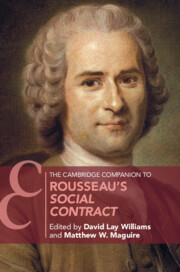Book contents
- The Cambridge Companion to Rousseau’s Social Contract
- Series page
- The Cambridge Companion to Rousseau’s Social Contract
- Copyright page
- Dedication
- Contents
- Contributors
- Acknowledgments
- 1 Introduction
- 2 “Every Legitimate Government Is Republican”
- 3 What If There Is No Legislator?
- 4 Rousseau’s Republican Citizenship
- 5 Rousseau’s Negative Liberty
- 6 Rousseau’s Ancient Ends of Legislation
- 7 Property and Possession in Rousseau’s Social Contract
- 8 Political Equality among Unequals
- 9 On the Primacy of Peoplehood
- 10 Rousseau on Voting and Electoral Laws
- 11 On the Possibility of a Modern Republic
- 12 Rousseau’s Case against Democracy
- 13 Rousseau’s Dilemma, or “Of Civil Religion”
- 14 Entreating the Political
- 15 Civil Religion and Political Unity
- Bibliography
- Index
- Series page
3 - What If There Is No Legislator?
Rousseau’s History of the Government of Geneva
Published online by Cambridge University Press: 28 March 2024
- The Cambridge Companion to Rousseau’s Social Contract
- Series page
- The Cambridge Companion to Rousseau’s Social Contract
- Copyright page
- Dedication
- Contents
- Contributors
- Acknowledgments
- 1 Introduction
- 2 “Every Legitimate Government Is Republican”
- 3 What If There Is No Legislator?
- 4 Rousseau’s Republican Citizenship
- 5 Rousseau’s Negative Liberty
- 6 Rousseau’s Ancient Ends of Legislation
- 7 Property and Possession in Rousseau’s Social Contract
- 8 Political Equality among Unequals
- 9 On the Primacy of Peoplehood
- 10 Rousseau on Voting and Electoral Laws
- 11 On the Possibility of a Modern Republic
- 12 Rousseau’s Case against Democracy
- 13 Rousseau’s Dilemma, or “Of Civil Religion”
- 14 Entreating the Political
- 15 Civil Religion and Political Unity
- Bibliography
- Index
- Series page
Summary
Rousseau’s Social Contract is known for its very distinctive doctrine of the separation of powers in which the legislative power (located in the community as a whole) is sovereign over the executive power (or government). According to Rousseau, the seeds of the downfall of every community, no matter how good it may be, is contained in the tendency of the government to usurp the powers of sovereignty. The sovereign can maintain its authority only if it is regularly assembled and passes judgment on the government, dissolving it and forming a new one if necessary. Critics from a variety of perspectives have argued that the practical and theoretical flaw in Rousseau’s account is that the sovereign can pronounce only when it is assembled and a usurping government can easily prevent it from assembling. I investigate this question by examining the Second Part of the Letters Written from the Mountain, where Rousseau describes the corruption of the Genevan government and discusses the resources available to citizens who wish to call it to account before an unassembled sovereign.
- Type
- Chapter
- Information
- The Cambridge Companion to Rousseau's Social Contract , pp. 40 - 63Publisher: Cambridge University PressPrint publication year: 2024



